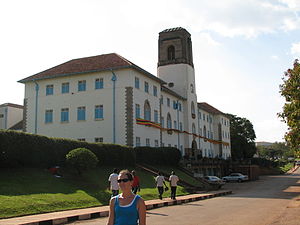Having experienced poverty as a young man, the late Lazaro Katarikawe (not real name) never wanted his family to suffer like he did when he was young. He was convinced that education is the key to breaking the cycle of poverty.
That is why he bought an Omnibus taxi and a farm with about 40 head of cattle in Rugando sub county in the Southwestern district of Mbarara before he got early retirement from public service in 1999 after suffering from cancer.

This is the time his two sons, Joseph and Paul were both joining university. In 2000, Katarikawe died. Before their father’s tomb could dry, the two boys connived and sold the omnibus and bought a luxurious Caldina saloon car in which they drove their girlfriends at campus.
Without a job, they started encroaching on the income from the farm to buy fuel and make repairs on the vehicle as well as get tuition fees. Luckily enough, the two brothers successfully completed their course and graduated in April 2003.
Joseph immediately got a job with a salary of UG SHS 400, 000 (about US $200) per month in a Tour and Travel Company in Kampala City. But because of his university education, he chose to rent a house of UG SHS 200, 000 (about US $100) per month, which he still shares with his brother who is still unemployed.
Because his income is more than their total expenditure, sometimes they go back home to ask their mother for some money for rent among other expenses. As a result, their younger siblings have failed to benefit from the university education their brothers got because there is no longer enough money. This is not an isolated situation in Uganda
Experts say that this kind of lifestyle by university students and graduates vis-à-vis the little pay by employers and the failure to get employment when they finish university are partly contributing to the rising poverty levels in the country.
According to the 2004 statistics from the Uganda Bureau of Statistics National poverty levels, which had been reducing since 1997, increased from 33.8 percent in the period 1999/2000 to 37.7 in the period 2002/2003.
Prof. David Krybill of Ohio State University in the USA and Barnabas Kiiza from Makerere University say that the university graduates are contributing to these unfavorable figures.
“While the increase in pupil’s finishing primary substantially reduced poverty levels in communities, increased number of university graduates is increasing poverty,” said the two professors, who are carrying out a survey on poverty levels in Uganda.
Prof. Krybill and Prof. Kizza who were recently presenting a paper on poverty in Uganda at Parliament say in their interim report-explaining poverty in Uganda that this is because many graduates have a high level of consumption yet they may not be employed to pay for their needs.
In many parts of Kampala where many graduates love to rent like in the suburbs of Ntinda and Bukoto, an average house or apartment for an average learned person is between UG SHS 100, 000 (about US $50) and UG SHS 250, 000 (about US $125) per month yet many organizations do not pay more than UG SHS 400, 000 (US $200) a month.
 “Look. I was paying 400, 000 shillings at the hostel per semester (an average of UG SHS 100, 000 per month or US $ 50) while I was at campus. There was DSTV, exotic showers, name it. Now that I am working why should I go to a muzigo (single room) of 70, 000 in Kiwunya (a notorious slum),” Asks, Alvin, who earns UG SHS 250, 000 (about US $ 125) per month. As long as I can pay my rent, the rest will come,” he consoles himself. Alvin says he spends more than a half of his salary on rent.
“Look. I was paying 400, 000 shillings at the hostel per semester (an average of UG SHS 100, 000 per month or US $ 50) while I was at campus. There was DSTV, exotic showers, name it. Now that I am working why should I go to a muzigo (single room) of 70, 000 in Kiwunya (a notorious slum),” Asks, Alvin, who earns UG SHS 250, 000 (about US $ 125) per month. As long as I can pay my rent, the rest will come,” he consoles himself. Alvin says he spends more than a half of his salary on rent.
Dr. Augustus Nuwagaba, a Makerere University lecturer and a poverty alleviation consultant from Reev Consult International says that the employment policy in the country is unfair and leads to exploitation of workers leading to poverty.
“We (Uganda) have a terrible working system. It is pushing some workers to the breaking point. To some people having no job is worse but to others having one is no better,” said Nuwagaba in an interview.
Nuwagaba says that the problem of poor remuneration to very many Ugandan workers is more compounded by failure by government to set minimum wage. It is also a result of some employers because of either, workers’ ignorance or desparacy employ people under no contracts signed and at the end dismiss them with out pay.
“It should be equal work for equal pay. But the situation currently is that some people who are working hard are getting less. This contradicts the principle justice of labor market,” said Nuwagaba.
Nuwagaba says that it is a common practice for many organizations both private and government companies to make people work without pay until they are put on the pay roll. “In such a situations those on probation work very hard to the extent of using their own money to cover costs of transport and meals hoping they will be taken up eventually,” said Nuwagaba.
Media organizations have especially been cited in this category of companies, especially radio stations. Both the Broadcasting Council and the Minister of state for Information James Nsaba Butoro have had to settle or failed to settle many cases of young journalist claiming that various radio stations have not paid them for months.
Nuwagaba says that in developed countries, graduates have had to deal with the problem through taking up more than one employment. But in a situation like Uganda where over 78% of the country’s labor force is unemployed, it is very difficult for any body to get more than one job.
In their report to be included in the revised Poverty eradication Action Plan (PEAP) 2001-2003, Social Development Sector (SDS) experts from the Ministry of Gender, Labor and Social Development say that Uganda’s economic improvement may have been spurred only by productivity gains without having any effect on creating jobs as expected. This is in spite of the huge numbers of graduates completing their university education and who want to enjoy high standards.
“According to Uganda Investment Authority records, 1 job has been realized for every 2 jobs projected. Employment projections today stand at some 210,000 jobs, suggesting that just over 100,000 jobs have been created through new investments on a cumulative basis since 1990,” reads UIA report.
Yet, employment creation has been described as a top priority for the country to exit poverty. Indeed, of the 12 factors identified by 19 communities as responsible for moving people out of poverty, the most stressed in the Uganda Participatory Poverty Assessment studies has been employment and availability of opportunities.
“The low levels of wage as opposed to self employment opportunities vis-à-vis the growing labour force have been identified as a major social and economic problem which has contributed to persistent poverty in Uganda,” reads the SDS report.
“Employment, by providing people with access to wages, therefore constitutes one of the most important forces in improving economic equity. Without sufficient growth in employment opportunities, the ability of an economy to eradicate poverty and inequality can be severely compromised,” it adds.
The report says that in order to achieve the broader objectives of the PEAP, it is important to support mechanisms being formulated by the SDS to widen access for wage employment as opposed to self-employment. It says that government also needs to implement strategies focusing on uplifting wages and conditions at the lower end of wage employment since many graduates in the country are trained for white-collar jobs.
However government recently announced a change in the education policy in which it is emphasizing the studying of sciences at the university as one way of solving the unemployment problem in order to reduce poverty among the graduates. The argument here is that science course are practical and they generate jobs more than the Arts course.
Analysts are skeptical about the new plan. They say that whereas government is talking about investing in science courses, the products (science graduates) are also getting peanuts yet they also want to live the exotic lifestyle.
Indeed, because of the little pay, many scientists are leaving the country to work in other countries where they can get better pay after government has spent huge sums of money on them to attain university education. This to some people has left university education the contributor rather than the tool for reducing poverty
By Munaabi G. Kworora, Ultimate Media













0 responses on "Poverty in Uganda: University Education a challenge to poverty eradication efforts"